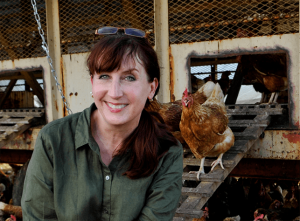Presented By: Department of English Language and Literature
Meat, Antibiotics, and the Power of Consumer Pressure
Maryn McKenna

Food Literacy for All
Food Literacy for All is a community-academic partnership course started in 2017. Structured as an evening lecture series, Food Literacy for All features different guest speakers each week to address challenges and opportunities of diverse food systems. The course is designed to prioritize engaged scholarship that connects theory and practice. By bringing national and global leaders, we aim to ignite new conversations and deepen existing commitments to building more equitable, health-promoting, and ecologically sustainable food systems.
Maryn McKenna Bio
Maryn McKenna is an independent journalist and author, specializing in public health, global health, and food policy, and a Senior Fellow of the Center for the Study of Human Health at Emory University, where she teaches health and science writing and storytelling, and media literacy. She is the recipient of the 2019 AAAS-Kavli Award for magazine writing for her piece "The Plague Years" in The New Republic, and the author of the 2017 bestseller Big Chicken: The Incredible Story of How Antibiotics Created Modern Agriculture and Changed the Way the World Eats (National Geographic Books, Sept. 2017), which received the 2018 Science in Society Award, making her a two-time winner of that prize. Big Chicken was named a Best Book of 2017 by Amazon, Science News, Smithsonian Magazine, Civil Eats, the Atlanta Journal-Constitution and the Toronto Globe and Mail; an Essential Science Read by WIRED; and a 2018 Book All Georgians Should Read. Her 2015 TED Talk, "What do we do when antibiotics don't work any more?", has been viewed 1.8 million times and translated into 34 languages.
"Meat, antibiotics, and the power of consumer pressure"
In the early 1950s, farmers began adding small doses of antibiotics to the diets of livestock. The drugs caused animals to put on weight more quickly and protected them against diseases, laying the foundation for modern intensive meat production — but they also fostered the emergence of drug-resistant bacteria that became a profound human health threat. Reversing that historic mistake took decades of research and policy maneuvering, but what really turned the tide was neither better science not tougher regulations: it was the power of consumer coalitions forcing the meat industry to change.
Food Literacy for All is a community-academic partnership course started in 2017. Structured as an evening lecture series, Food Literacy for All features different guest speakers each week to address challenges and opportunities of diverse food systems. The course is designed to prioritize engaged scholarship that connects theory and practice. By bringing national and global leaders, we aim to ignite new conversations and deepen existing commitments to building more equitable, health-promoting, and ecologically sustainable food systems.
Maryn McKenna Bio
Maryn McKenna is an independent journalist and author, specializing in public health, global health, and food policy, and a Senior Fellow of the Center for the Study of Human Health at Emory University, where she teaches health and science writing and storytelling, and media literacy. She is the recipient of the 2019 AAAS-Kavli Award for magazine writing for her piece "The Plague Years" in The New Republic, and the author of the 2017 bestseller Big Chicken: The Incredible Story of How Antibiotics Created Modern Agriculture and Changed the Way the World Eats (National Geographic Books, Sept. 2017), which received the 2018 Science in Society Award, making her a two-time winner of that prize. Big Chicken was named a Best Book of 2017 by Amazon, Science News, Smithsonian Magazine, Civil Eats, the Atlanta Journal-Constitution and the Toronto Globe and Mail; an Essential Science Read by WIRED; and a 2018 Book All Georgians Should Read. Her 2015 TED Talk, "What do we do when antibiotics don't work any more?", has been viewed 1.8 million times and translated into 34 languages.
"Meat, antibiotics, and the power of consumer pressure"
In the early 1950s, farmers began adding small doses of antibiotics to the diets of livestock. The drugs caused animals to put on weight more quickly and protected them against diseases, laying the foundation for modern intensive meat production — but they also fostered the emergence of drug-resistant bacteria that became a profound human health threat. Reversing that historic mistake took decades of research and policy maneuvering, but what really turned the tide was neither better science not tougher regulations: it was the power of consumer coalitions forcing the meat industry to change.